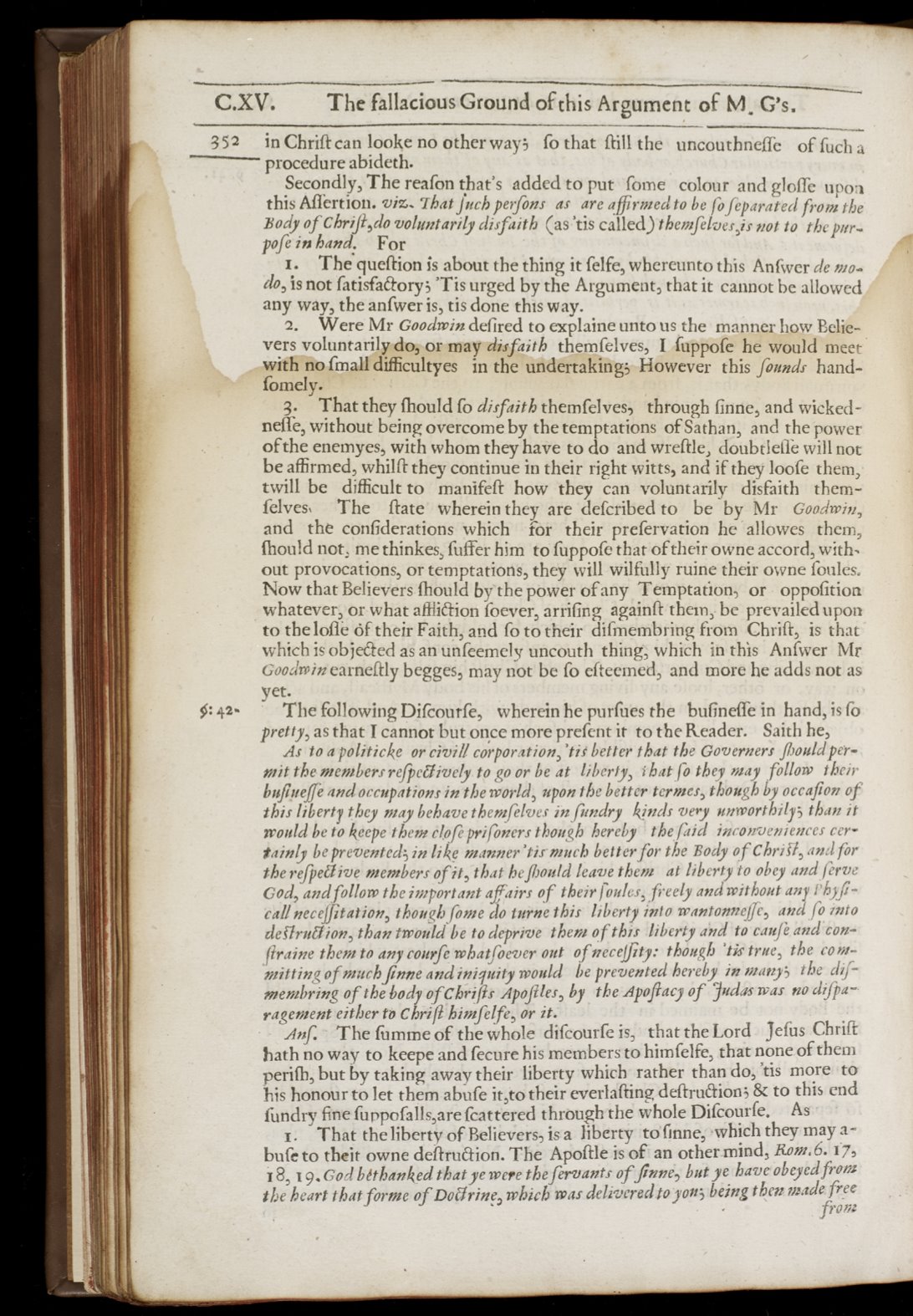

C.XV.
The
fallacious
Ground
of
this Argument
of
M. G's.
352
in
Chrift
can
looke no
other
way;
fo
that
Rill
the
uncouthneffe
of
fuch
a
procedure abideth.
Secondly,
The
reafon
that's added
to
put
Come
colour
and
gloffe
upon
this Affertion.
viz.
Thatfilch
perfons as
are affirmed
to
be
fo
feparated
from the
Body
of
Chrift
do
voluntarily
disfaith
(as-'tis
called)
themfelves,is
not
to
the
pier
-
pofe
in
hand.
For
I.
The
queftion
is
about the thing
it
felfe,
whereunto
this
Anfwer
de
mo-
do, is
not
fatisfa&ory;
'Tis
urged by
the Argument, that it
cannot be
allowed
any
way,
the
anfwer
is,
tis done this way.
2.
Were
Mr
Goodwin
defired
to
explaine
unto
us
the manner
how
Belie-
vers voluntarily do,
or
may
disfaith themfelves,
I
fuppofe
he would
meet
with
no
final].
difficultyes
in
the
undertaking;
However this
founds
hand-
fomely.
3.
That
they fhould
fo
disfaith themfelves, through finne, and
wicked
neffe;
without
being overcome by
the
temptations
of
Sathan, and
the power
ofthe
enemyes,
with
whom
they have to do and
wreftle, doubtleffe
will
not
be
affirmed, whilft
they continue
in
their
right witts, and
if
they
lode
them,
twill
be
difficult
to
manifeft how they can voluntarily disfaith them-
felves.
The
fate
wherein they are defcribed
to
be by Mr
Goodwin,
and the
confiderations
which
for
their
prefervation he
allowes
them,
fhould
not,
methinkes, fuller him
to
fuppofe
that
of
theirowne
accord,
with.
out
provocations,
or
temptations, they
will wilfully
ruine their owne
foules.
Now
that
Believers
fhould
by
the
power
of
any
Temptation, or
oppofition
whatever, or what afli
&ion
foever, arrifing againft
them,-
be prevailedupon
to
the lode
of their
Faith, and
fo
to
their
difinemhring from Chriff,
is
that
which
is
obje&ed
as
an
unfeemely
uncouth thing;
which
in
this Anfwer Mr
Goodwin
earneftly begges, may
not
be fo
efteemed, and
more he adds
not
as
yet.
4:42-
The
following Difcourfe, wherein he
purfues
the
bufìneffe
in
hand,
is
fo
pretty,
as
that
I
cannot
but
once more prefent it
to
the
Reader.
Saith
he,
As to
a
politicl<e or
civil/ corporation,'iii
better
that
the Governers
fbouldper-
mit the
members
refpetEively
to
go
or
be
at
liberty,
that
fo
they may follow
their
buftueffe
and
occupations
in the
world,
upon
the better termer, though
by
occafion
of
this
liberty
they may behave themfelves
in fundry
kinds
very
unworthily; than
it
would
be
to
keepe
them
clofe
prifoners though
hereby
the Paid inconveniencescer-
tainly
be
prevented; in
like
manner'tis-
much
better
for
the
Body
of
Chri
l.,
and
for
the
refpeE`ive
members
of
it,
that
hef7iould
leave them
at
liberty
to
obey
and ferve
God,
and
follow
the important affairs
of
their
foules, freely
and without
any
l'hyfr-
call
necejtation,
though
fome
do
turne
this
liberty into
wantonneffe,
and
fo
into
deft
region,
than
twould
be to
deprive them
o
f
this
liberty
and
to
caulè.and
con-
graine
them
to
any
court
whatfoever
out
ofnece(tty:
though
'tis true, the
com-
mitting
of
much
finne and
iniquity
would
be
prevented
hereby
in
many;
the dif-
membring
of
the
body
ofChri/is
Apofiles,
by
the
Apofiacy
of
yudas
was no difpa
ragementeither
to
C
hriff
himfelfe,
or
it.
Anf.
The
fumme
of
the
whole difcourfe
is,
that
the Lord jefus
Chriff
bath
no way
to
keepe and fecure
his
members
to
himfelfe,
that
none
of
them
perith,
but
by
taking
away
their liberty
which
rather
than do
'tis
more
to
his
honour
to
let
them abufe
it,to their
everlafting deftru&ion;
&
to
this
end
fundry
fine
fuppofalls,are
fcattered
throughthe
whole Difcourfe.
As
r. That
the liberty
of
Believers,
is a
liberty
to
finne; .which
they
may
a-
bufe
to
theit
owne deflru
&ion.
The
Apoftle
is
of
an
othermind,
Rom. 6.
r7,
i
8,
t
g.
God
bethanked
that
ye
were
the
fervants
of
finne,
butye have
obeyed
from
the
heart
that
forme
of
Dotfrine,
which was
delivered
dto
you;
being
then
made
free
from










